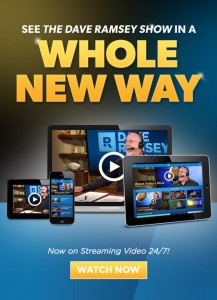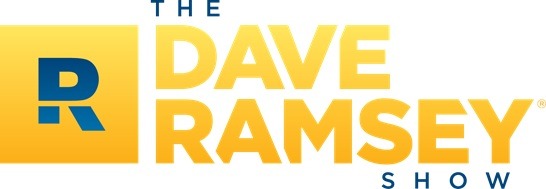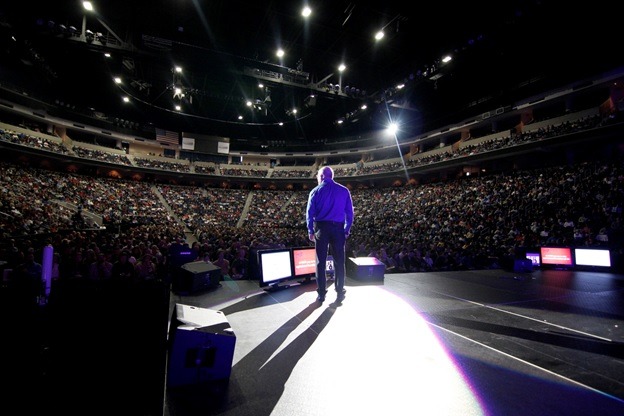This may come as a shock to some people but not every talk show on the radio is about politics. In a world of syndicated talk radio shows, there is one host that stands apart: Dave Ramsey. And in fact, his model may be the most successful of all.
Consider this: The Dave Ramsey Show has 550 affiliates, an iHeartRadio channel, and a 24-hour streaming video channel. All told, 8.5 million people listen to versions of Dave’s show. Then there are the events – including at least a dozen planned for this fall that involve his radio affiliates.
 Not a typical radio talent, after graduating from college, Ramsey started investing in real estate and by the age of 26 had built a rental portfolio worth more than $4 million. But he soon ran into financing problems and had to declare bankruptcy. After that, he began studying money and finances and wrote the book Financial Peace, offering advice to consumers about handling money and avoiding debt.
Not a typical radio talent, after graduating from college, Ramsey started investing in real estate and by the age of 26 had built a rental portfolio worth more than $4 million. But he soon ran into financing problems and had to declare bankruptcy. After that, he began studying money and finances and wrote the book Financial Peace, offering advice to consumers about handling money and avoiding debt.
Since that humble beginning, Ramsey has launched a radio show, a television show, written many more books, and began hosting live events in sold-out arenas that resemble rock concerts. Every step of the way, he has charted his own course.
From in-house syndication to rolling out a new faith-based project with Salem Broadcasting, Dave has done things his way, often breaking ground where other shows were afraid to tread. With a staff of nearly 500, Dave Ramsey is a mega-brand, and radio was his launching pad – precisely why we asked him to be the subject of this week’s edition of Radio’s Most Innovative.
JM: You started in real estate and then, after going broke, wrote the book Financial Peace before launching your radio show. How did the idea of starting the show come about?
DR: In 1992, I was a guest on a local radio show on a station that was bankrupt. The host and I talked about real estate and going broke, and the phones started ringing with people wanting to ask questions. The station couldn’t pay the host – so the guy quit. So a friend of mine and I called the GM and met with him about doing a show on money and finances. They had no money, so we did the show for free…just for fun. My friend said, “Maybe you can even sell a few copies of that dumb ole book of yours.” Today, we look back on those primitive, humble beginnings and we see there was no indication it would ever actually succeed.
JM: As the show has grown over the years, what were some of the biggest hurdles you’ve faced and how did you overcome them?
DR: In the early days we really had no idea what we were doing, but in hindsight that was a good thing because we didn’t know the word “impossible.” A lot of people told us we couldn’t do it, but we just never quit. To this day it’s one of our key core values. Never, ever, ever give up.
JM: Have you always handled your own syndication? What led to your decision to take it on yourself?
DR: Syndication has been managed in-house from day one. We learned early on that relationships are the cornerstones of success in this business, and direct relationships with our affiliates provided us with an incredible opportunity to serve. It wasn’t easy, especially in the beginning. Lots of industry big shots told us that our approach would never succeed. But here we are now, the third largest national-syndicated talk radio show in the country. I think we did all right.
JM: You provide a lot of support for your affiliates that other shows don’t. Can you talk about the resources you make available to stations that carry your program?
DR: We do everything we can to help our affiliates assure the success of our show in their markets, and our goal is simple – leave nothing to chance. We have the only dedicated affiliate relations team out there that focuses on working directly with each and every affiliate. This team supports programming and sales, sharing best practices from our network and providing resources for the local sales teams. There’s no cookie cutter approach to this kind of work, because each and every market is unique. That means every relationship must also be unique.
JM: How important is your organization to your brand’s success, and how many people currently work for you?
DR: It’s huge. We have close to five hundred people on our team – really talented people and incredible leaders who have a shared purpose. We work really hard on the unified goal of helping people and providing hope. Those goals help create a culture of unity. This is one of the main reasons we’ve been named among Nashville’s best places to work eight straight years.
JM: You leverage your brand in many unique ways. How do you identify appropriate brand extensions?
DR: Our team members do a lot of planning; months, sometimes years in advance. If the team determines that extending the brand into a new area of need is consistent with our purpose of giving hope, then we’ll explore and pursue those opportunities.
JM: How does radio now fit into all the other activities you’re involved in?
DR: We started in radio, and I still believe there’s no better medium for making a one-on-one connection with each caller. It’s an amazing feeling to come away from a conversation knowing that you helped someone and gave them hope. Radio is an incredible medium, and we’re proud to be part of it.
JM: Events play a large role in what you offer. Talk about how that got started and where radio fits in with the events you do.
DR: We developed a strategy in the very beginning to work closely with our affiliates on promotion when bringing events into their markets. This helps provide sold-out events all across the country for us, and some amazing NTR opportunities for them. It’s a win-win situation.
JM: Even though you are a national brand, you are deeply involved on the grassroots level, between local events and preferred local vendors. Why the emphasis on a local strategy?
DR: I and so many on our team have the heart of a teacher. What we teach really matters to people; really changes them. We want to hear people’s stories. We want to see their “light bulb moment.” Meeting them where they are keeps us motivated, too. We’re about the business of people.
JM: Video also plays a big part in your multi-media activity. Do you see that growing and how does it enhance your brand  and your business?
and your business?
DR: One of the most rapidly changing environments today is how individuals consume content. It has always been our intent to meet our consumers where they are and make a connection. We also must acknowledge that the consumer is in control and it’s our responsibility to be available when, where, and how they chose to consume. Technology is a rapidly changing environment and video is one of the fastest growing segments within.
We launched the video channel in 2013 and have experienced steady growth with this product. We also post key segments from the show on our YouTube channel, which just surpassed 10 million views. We are reaching a segment of the audience that prefers video delivery and are happy with its current success, but as with all our other digital ventures, we are still learning how to best produce the product and best serve this unique consumer. What we have found is that we are reaching a new audience and that was our goal from the start.
JM: How does podcasting/on-demand radio fit into your plan? Where do you expect that to be in the next five years?
DR: There is no question that podcasts have exploded in the digital space. We currently have more than 300,000 daily downloads of The Dave Ramsey Show podcast, which positions us as one of the leaders in this category. On-demand radio is a product that is still defining itself and the best on-demand solution currently is podcasts. Like all things digital, we are in constant development and keeping a close eye on the market for new opportunities. As for what we expect five years from now… that depends on the consumer because they are in control and we will be where they go.
JM: Some would say that the radio business is challenged. What’s your prognosis and opinion about its future?
DR: What’s always interesting is the number of opinions and speculation. We subscribe to the opinion that the one constant in life is that there is going to be change. Radio is not immune and is experiencing change just like every other media outlet. Online opportunities, consumer behavior, operating expenses, and competition all add to the equation and require adaptation of some sort. “Challenged” is not a word I would use to describe radio. Radio has been around and relevant for many years and will be for many years to come.
JM: Talk radio appears to be going through changes as political talk shows aren’t garnering the same ratings they used to. Are you worried that fewer listeners will be tuning to stations that carry your show?
DR: Do you have any suggestions for how to maintain listenership? Since our show is not about politics, it serves as something of a diversion from all the political chatter out there. We try to give listeners hope and solid advice. That’s something you rarely hear in conversations about politics and government. Still, we’re not invincible. We’re always subject to the overall audience exposure and opinions in each market.
When it comes to maintaining and growing our audience, we take hold of that responsibility personally as much as we rely on our stations. Relevant, helpful content creates loyal listeners. Our ability to introduce the show and our message through a variety of products, whether it’s our bestselling books, Financial Peace University or our high school curriculum, it is a great asset. Add to that a social audience on Facebook and Twitter exceeding three million fans, and we have the ability to move the needle from within, as well as working with local affiliates to promote the show.
JM: There are a lot radio companies in debt, hindering many from investing in research, program development, personalities, and resources. What financial advice would you give the radio industry about how to create a more successful business model?
DR: In every business, whether it’s radio or a shoe company, debt adds risk and keeps you from being able to invest in the business. Get rid of debt. Warren Buffet said, “When the tide goes out, you can tell who was skinny-dipping.” Those who do not follow common sense, conservative money principles leave themselves and their businesses vulnerable to the whims of their competitors, every little ripple in the market, and certainly to big shifts in the economy.
JM: What is the role of faith in your career and how does it figure into your philosophy today?
DR: It’s like that old story of the boy walking along the dirt road and he sees a turtle sitting on top of the fence post. That’s a pretty curious sight, especially when there’s no one around to explain it to you. There’s only one thing for sure: The turtle didn’t get up there by himself. I am the turtle on a fence post. I didn’t get up there on my own. Certainly God has chosen to bless the work that we do. We’re missional, passionate, and driven in what we do, and we have a blast doing it.
JM: You recently partnered with the Salem Media Group to launch a new show called Chris Brown’s True Stewardship. Where did the idea come from and how is this show different from yours?
DR: We’ve had a vision for probably a decade or so to reclaim the word “stewardship.” It’s an old Christian word that simply means managing God’s blessings His way for His glory. These days a lot of Christians think stewardship means we’re going to build another building and they grab their wallets. Years ago, people like Larry Burkett, Howard Dayton, and Ron Blue heavily influenced me on Christian radio. So the vision is now a reality. Chris is a great teacher and communicator and he’s going to be teaching what the Bible says about money.
JM: You are extremely entrepreneurial. What advice do you have for someone with a new idea that isn’t sure how to pursue bringing it to fruition?
DR: I say all the time there has never been a better time than right now in America to start a business. Ideas are everywhere. All you have to do is believe. Fear and a lack of  belief are the biggest hurdles to leap. Be intentional about it and set goals. Goals are visions and dreams with work clothes on. So my advice is: get to work! You get to decide what you are. Make a plan, set your goals, become the captain and drive the ship.
belief are the biggest hurdles to leap. Be intentional about it and set goals. Goals are visions and dreams with work clothes on. So my advice is: get to work! You get to decide what you are. Make a plan, set your goals, become the captain and drive the ship.
JM: You are one of the most successful radio personalities in history. What advice would you give to a local personality trying to extend his/her reach?
DR: Make sure it’s your passion. Passion causes things to move. Learn from people who’ve been successful, and learn from the mistakes of others. Trust me, learning from other people’s mistakes is less painful than making your own. And finally, don’t listen to naysayers. These days they’re everywhere. You can count on criticism if you do anything of scale that matters. Don’t be afraid of it. It comes with the territory.
Thanks to Mike Stern for writing and putting together this week’s RMI.
INNOVATION QUOTE OF THE WEEK
“I’m only rich because I know when I’m wrong…I basically have survived by recognizing my mistakes. “
George Soros, American businessman, investor, philanthropist
More of Radio’s Most Innovative
- Radio’s Most Innovative: Fun Kids
- Radio’s Most Innovative: Radio Broadcasting
- Radio’s Most Innovative: Radio.com’s Minimations
- Radio’s Most Innovative: Joel Denver/All Access
- Radio’s Most Innovative: WNIC’s “Pillow Talk” with Alan Almond
- Like A Pair Of Old Jeans - April 2, 2025
- What’s Fair Is Fair - April 1, 2025
- What’s On Your Bucket List? - March 31, 2025







I think radio is secondary to what Dave does. He’s literally on a mission from God, and the radio is just a tool he uses.
As Dave would likely tell you, Don, his footprint is large and his philosophy is overarching, but it is radio that has made it all possible. Thanks for the comment.
He’s doing media the right way for this day and age, that’s for sure.